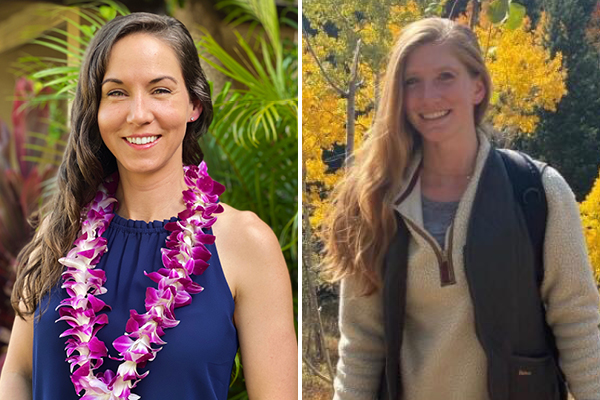Author: Willona M. Sloan
Nurse practitioner residency programs can provide new graduates with mentoring and guidance, while building their professional confidence. These opportunities, while still rare, continue to expand across the country. Monica Joiner and Tessa Warfield, two graduates of GW Nursing’s MSN: Adult-Gerontology Primary Care Nurse Practitioner (AGPCNP) program, share their residency experiences and discuss how GW Nursing prepared them to take their professional learning to the next level.
Ms. Warfield is a resident in the Primary Care Nurse Practitioner Residency and Training Program at the Baltimore Veteran Affairs (VA) Medical Center, where she sees patients, while also receiving mentoring from experienced nurse practitioners and attending physicians.
“I really liked that there was going to be a lot of support for that first year as a new nurse practitioner, which is really crucial,” said Ms. Warfield. “I’ve heard stories of people not having enough support during their first months as a nurse practitioner, and feeling very overwhelmed.”
Ms. Warfield appreciates that the residency program offers a year-long commitment, with rotations in various specialty areas. At GW Nursing, Ms. Warfield found her geriatric home health rotation to be her favorite, which also attracted her to the geriatric-focused residency program with the VA.
GW’s program taught her the clinical skills she needs, as well as developing her leadership skills, said Ms. Warfield. She especially appreciated faculty members Lorrie Taylor Rilko, DNP, APRN, FNP- BC, ADM- BC, clinical assistant professor, and Margaret Venzke, DNP, RN, FNP-BC, Director of the AGPCNP program.
“They were two very supportive professors that I was really grateful to have,” said Ms. Warfield.
She will continue her residency through the summer. “Right now, I’m doing a diabetes clinic, and cardiology, and I’m really loving both of those,” she said. “I might see myself working at the VA long-term, and maybe finding a diabetes clinic at some point, or working in geriatric home health.”
As Ms. Warfield notes, the field of Adult-Gerontology offers nurse practitioners the chance to focus on specialty areas that interest them most. “For someone who is really interested in developing specialty in adult health, cardiology, oncology or neurology, or they want to go into palliative care or hospice care, this is a field, and this is a program, where they [can do that],” said Dr. Venzke.
For graduates who wish to further develop their professional skills, a residency program could be a good next step. “Because of the nature of healthcare, Ms. Warfield and Ms. Joiner applied for these residencies so that they could further their expertise with guidance and mentoring,” said Dr. Venzke. “They were chosen because they were very strong both clinically and as leaders.”
Mrs. Joiner is a nurse practitioner resident in the Na Lei Kukui Nurse Practitioner Residency Program at Waianae Coast Comprehensive Health Center, which is the largest federally-qualified health center on Oahu, Hawaii. The purpose of the residency is to develop new graduate nurse practitioners into “competent, confident primary care providers” for underserved Native Hawaiian and Pacific Islander populations who reside on the underserved West Coast of Oahu, said Mrs. Joiner.
“The Na Lei Kukui NP Residency Program is unique in that it not only teaches us how to be confident NPs, caring for patients with complex health care problems, but it also immerses us within the Native Hawaiian culture of West Oahu,” said Mrs. Joiner.
Mrs. Joiner was also selected for the National Health Service Corps Loan Repayment Program, which has a service obligation of three years within the community health setting at a federally-qualified health center.
Mrs. Joiner feels that her training through GW Nursing’s AGPCNP program prepared her well for these next steps in her career. “Without a doubt, the education and opportunities at GW set me on this very path, caring for the underserved within community health,” she said.
During her GW graduate program, she was selected for the Nurse Practitioner Technology Enhanced Community Health (NP-TECH) Scholar Program. “It is NP-TECH that helped educate me in the social determinants of health within both urban and rural underserved communities and taught me extremely valuable skills in telehealth technology,” she said.
During her graduate studies, she also learned the valuable skill of perseverance. “My experience in graduate school was unique and full of challenges,” said Mrs. Joiner.
First, her husband, an active-duty service member, and their four young children had to move twice during her graduate program due to sudden changes in her husband’s duty station. She also suffered the loss of two family members. “My brother took his life just a couple of months after we moved to Hawaii, and my mother died from lung cancer in the final semester of my NP program,” said Mrs. Joiner.
Despite these devastating losses, she continued on. “I received overwhelming support from both my program director and my clinical faculty member who mentored me along my entire journey and continue to keep in close contact beyond graduate school,” said Mrs. Joiner.
“I believe that perseverance, support, and timing all worked out in the end to bless me with high achievements and multiple amazing opportunities after graduating my NP program,” she said.


